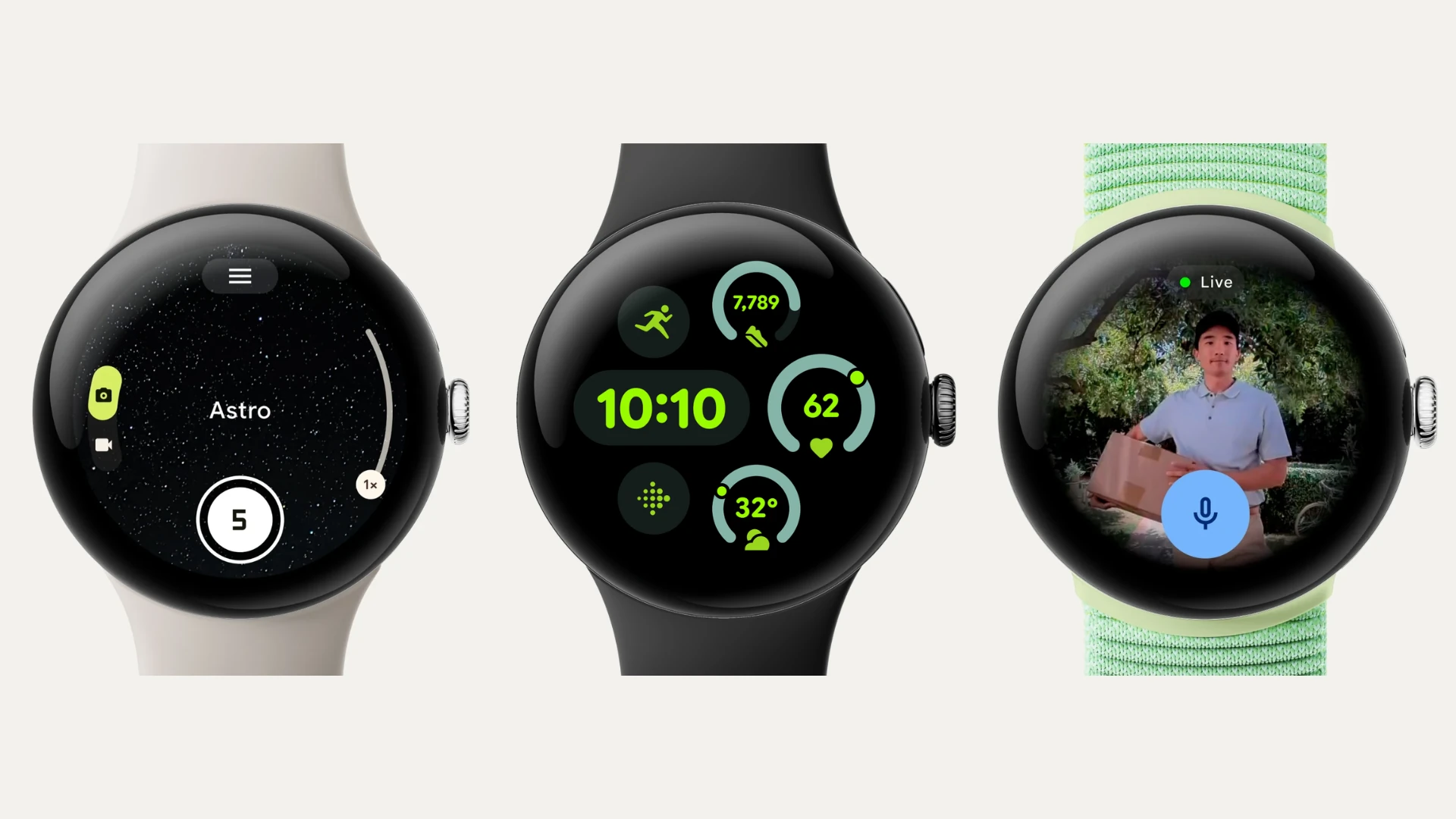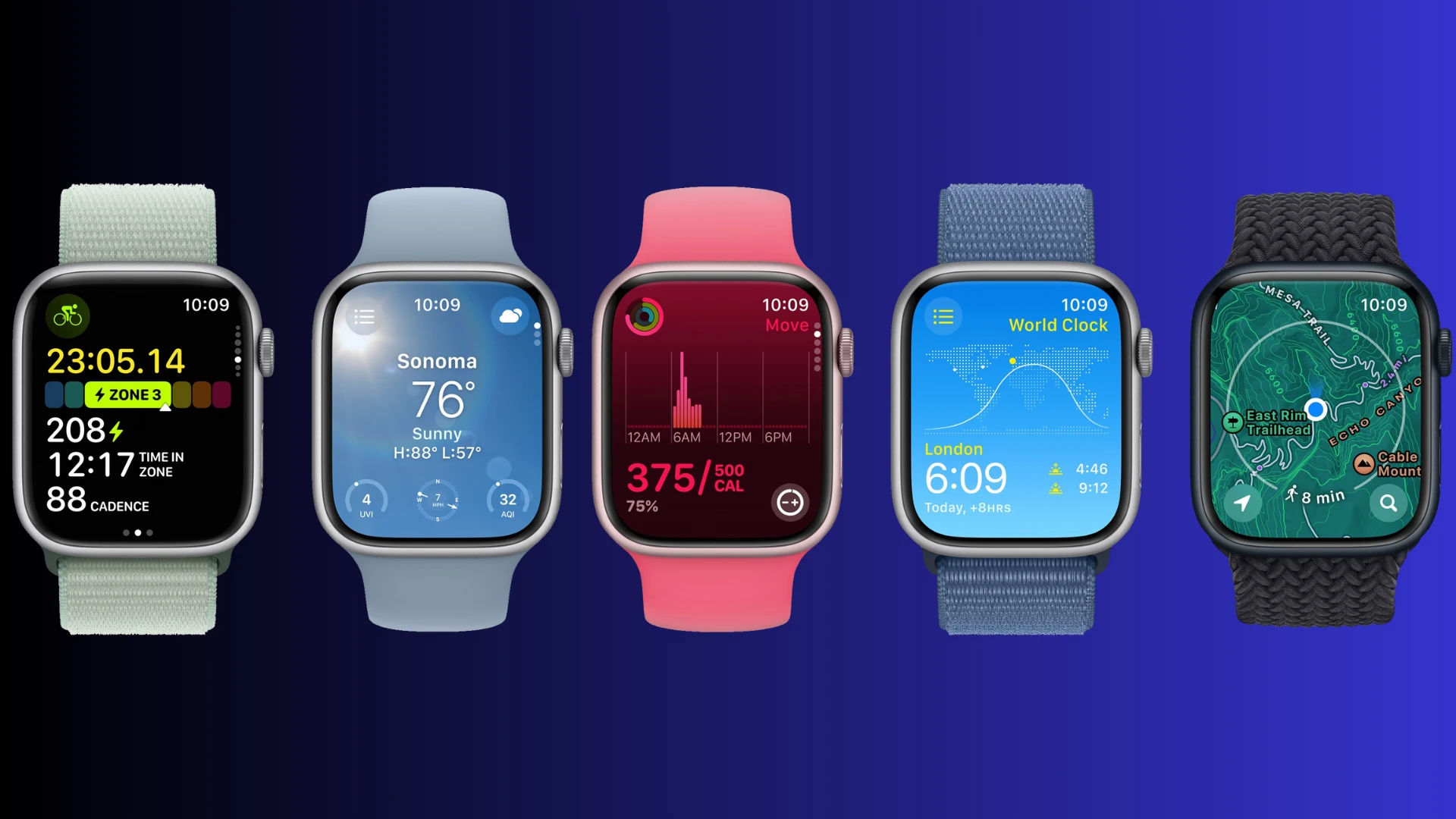Photo credit: Nebula by Anker
Portable projectors are no longer just a novelty item. They’ve become a staple for movie enthusiasts, outdoor adventurers, and anyone seeking a big-screen experience on the go. With their compact size and impressive capabilities, these handy gadgets let you enjoy your favorite films and shows virtually anywhere. Whether you’re hosting a backyard movie night, camping under the stars, or simply want to create a cozy cinema in your living room, a portable projector can be your ticket to unforgettable entertainment.
But with so many options available, how do you choose the right one? Don’t worry, we’ve got you covered. In this guide, we’ll explore the exciting world of portable projectors, break down the key features to look for, and help you find the perfect one for every occasion.
Why Choose a Portable Projector?
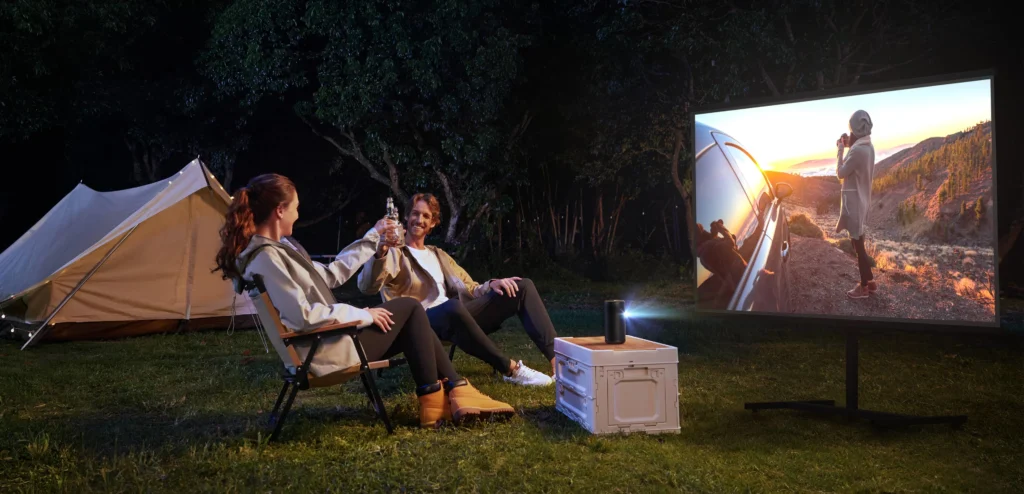
Photo credit: Nebula by Anker
Before we look into the nitty-gritty of features and recommendations, let’s explore why portable projectors have become so popular. What makes them such a compelling alternative to traditional TVs or home theater setups?
- Portability: As the name suggests, portable projectors are designed to be compact and lightweight, making them easy to carry around. Whether you’re heading to a friend’s house, on a camping trip, or simply moving from one room to another, a portable projector offers unparalleled flexibility.
- Versatility: These devices aren’t just for watching movies. You can use them for playing games, giving presentations, showing photos, or watching videos outside. You can even use them to decorate your home by projecting images or patterns onto your walls. They’re also great for keeping kids entertained with interactive games or educational videos.
- Affordability: Compared to large-screen TVs, portable projectors often offer a more budget-friendly option for enjoying a big-screen experience. You can find excellent models at various price points.
- Easy Setup: Setting up a portable projector is a breeze. Simply connect your device (laptop, smartphone, gaming console, etc.) and project onto any flat surface – a wall, a screen, or even a bedsheet!
- Space-saving: Unlike bulky TVs, portable projectors don’t take up valuable floor space. When not in use, they can be easily stored away, making them ideal for smaller living spaces.
In short, portable projectors offer a unique combination of convenience, versatility, and affordability, making them a fantastic choice for anyone seeking a big-screen experience without the limitations of traditional setups.
If you’re looking to access content from different regions, you can potentially use your portable projector with a VPN. However, connecting a projector to a VPN, especially when using screen mirroring, can sometimes be tricky. Consider using a wired connection (like HDMI) from your device to the projector. This method bypasses any issues related to VPNs affecting wireless connections. Also, check out our guide on Unlocking Global Content: Find the Best VPN for Streaming to learn more about VPNs.
Key Features to Consider When Choosing a Portable Projector
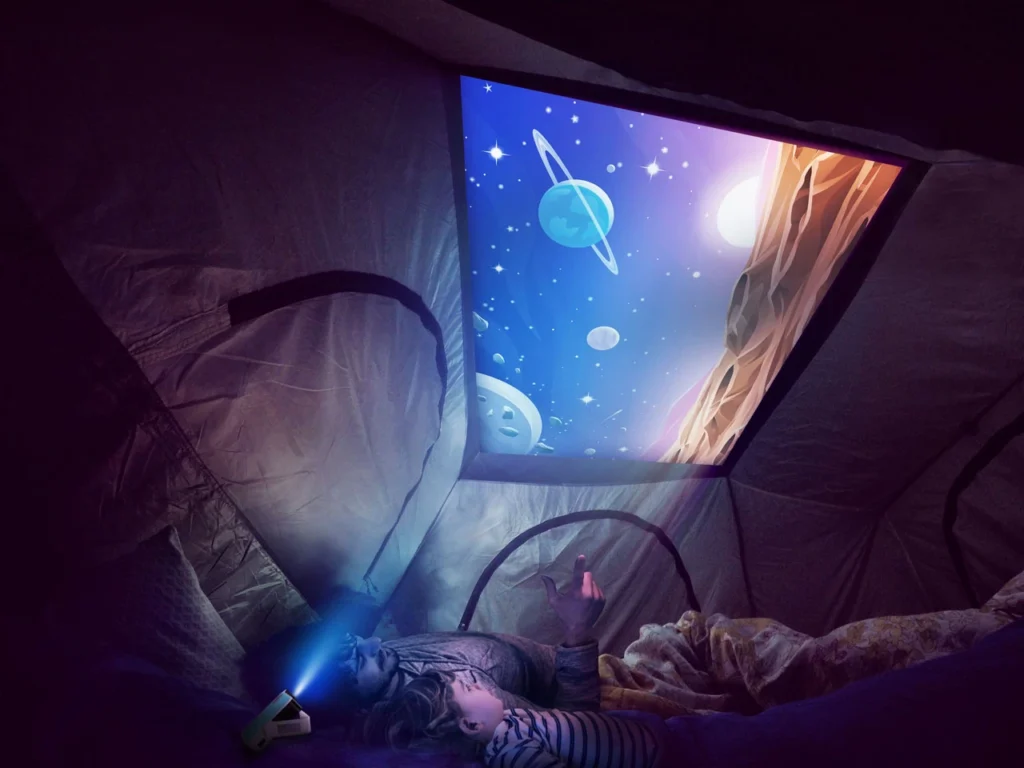
Photo credit: ViewSonic
Now that you’re convinced of the awesomeness of portable projectors let’s talk about the key features to look for when making your purchase. Understanding these features will help you choose a projector that perfectly suits your needs and preferences.
Brightness: Brightness is measured in lumens, and it determines how well the projector performs in different lighting conditions. For dimly lit rooms, a lower lumen count (around 200-300) might suffice. However, if you plan to use the projector in brighter environments or outdoors, you’ll need a higher lumen count (500 or more).
Resolution: Resolution refers to the number of pixels displayed on the screen. Higher resolution means sharper and more detailed images. Common resolutions for portable projectors include:
- Standard Definition (SD): 480p
- High Definition (HD): 720p or 1080p
- 4K: Offers the highest level of detail and clarity, but it comes at a premium price.
Contrast Ratio: This indicates the difference between the brightest and darkest parts of an image. A higher contrast ratio results in a more dynamic and visually appealing picture.
Throw Ratio: This determines the projector’s placement relative to the screen size. A short-throw projector can create a large image from a short distance, while a long-throw projector requires more space. Consider your room size and setup when choosing the right throw ratio.
Battery Life: If you plan to use your projector on the go, battery life is crucial. Look for models with a long battery life (at least 2-3 hours) to ensure uninterrupted entertainment.
Connectivity: Ensure the projector has the necessary ports to connect your devices. Common options include HDMI, USB, Wi-Fi, and Bluetooth. Some projectors even offer screen mirroring capabilities for seamless wireless connection.
Portability: Consider the projector’s size and weight, especially if you plan to travel with it frequently. Look for compact and lightweight models that are easy to carry and store.
By considering these key features, you can narrow down your options and find a portable projector that perfectly matches your needs and budget.
Best Overall Portable Projector: Anker Nebula Capsule 3 Laser
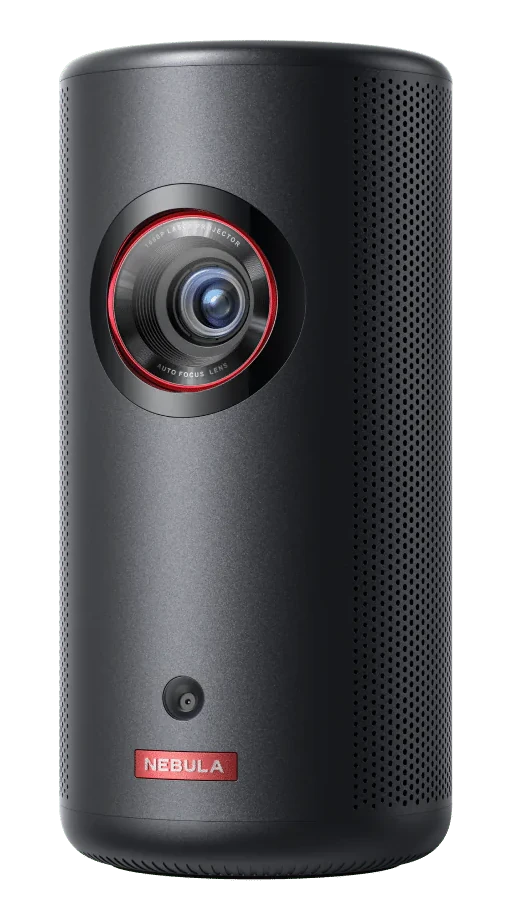
Photo credit: Nebula by Anker
Why we love it: The Anker Nebula Capsule 3 Laser is a powerhouse in a soda-can-sized package. It delivers clear 1080p (FullHD) visuals with 300 ANSI lumens of brightness, making it perfect for movie nights at home or even outside if it’s not too bright out. The picture quality is amazing, with vibrant colors and super sharp images thanks to its laser light source. Plus, with Android TV 11.0, you’ve got access to lots of streaming apps. And with a 2.5-hour battery life, you can watch a whole movie without needing to plug it in. It even doubles as a Bluetooth speaker!
Key Features
- 300 ANSI lumens brightness
- 1080p resolution (Full HD)
- Laser light source
- Android TV 11.0
- 2.5-hour battery life
- Autofocus and keystone correction
- 8W Dolby Digital speakers
- Nebula Connect app for remote control and navigation
Cons
- Struggles in brighter settings
- Fan noise can be noticeable in quiet environments
- Limited internal storage (16GB)
- No preloaded Netflix app
Connectivity: HDMI, USB-C, Wi-Fi, Bluetooth, Chromecast built-in, and screen mirroring capabilities for seamless wireless connection with various devices, including smartphones and tablets.
Best Portable Projector for Outdoor Entertainment: BenQ GS50
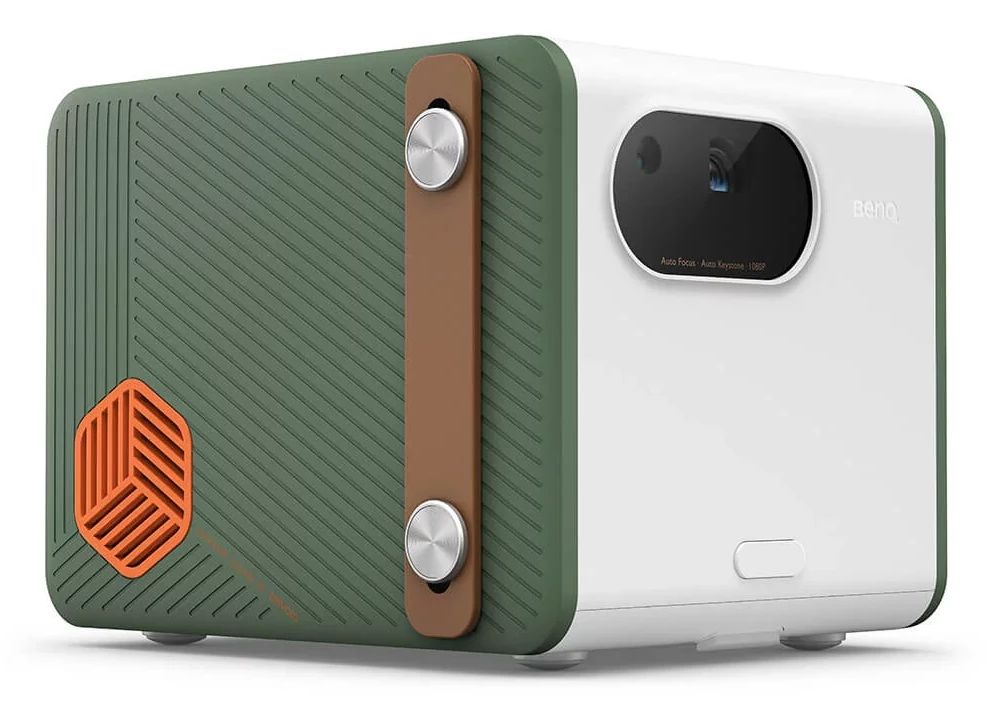
Photo credit: BenQ
Why we love it: The BenQ GS50 is a fantastic all-around portable projector that’s perfect for outdoor adventures. It boasts 500 ANSI lumens brightness and 1080p resolution, with clear and vibrant visuals even in moderately lit environments. Its durable and splash-proof design (IPX2 rating) makes it resistant to the elements, while the built-in 2.5-hour battery lets you enjoy movies, shows, or games without needing a power outlet. The 2.1-channel audio system with dual 5W midrange tweeters and a 10W woofer delivers powerful sound, perfect for outdoor gatherings.
Key Features:
- 500 ANSI lumens brightness
- 1080p resolution
- Dedicated Game Mode
- 2.5-hour battery life
- Android TV built-in
- Durable and splash-proof design (IPX2)
- 2.1-channel audio system (dual 5W midrange tweeters with a powerful 10W woofer)
- BenQ Smart Control app for remote control and navigation
Cons:
- Can be a bit pricey
- Not the brightest option for outdoor use in daylight
Connectivity: HDMI, USB-A, and Wi-Fi, providing versatile connection options for gaming consoles and other devices.
Best Budget-Friendly Portable Projector: ViewSonic M1 Mini Plus
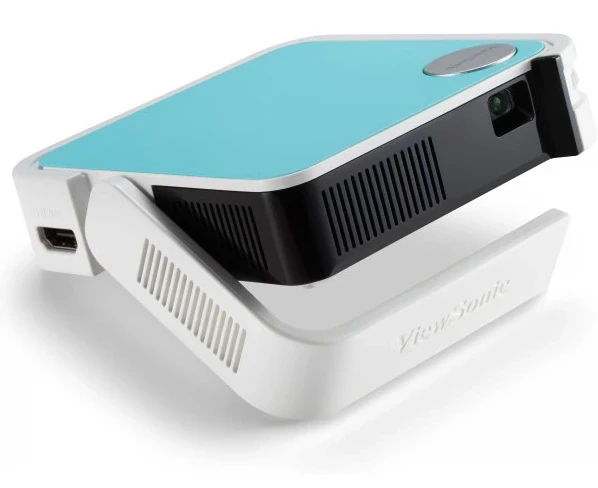
Photo credit: ViewSonic
Why we love it: The ViewSonic M1 Mini Plus proves that you don’t need to spend a fortune on a good portable projector. It’s small and light, making it easy to take anywhere. Despite its size, the picture quality is surprisingly good, with 120 ANSI lumens brightness and WVGA (854 x 480) resolution, even in low light. It also has a built-in JBL speaker for awesome sound and Wi-Fi mirroring for easy wireless connection. Plus, the automatic vertical keystone correction takes the hassle out of adjusting the image, and the built-in battery can keep the fun going for up to 1.5 hours without any cords.
Key Features
- 120 ANSI lumens brightness
- WVGA (854 x 480) resolution
- LED light source
- 1.5-hour battery life
- Built-in kickstand
- Compact and portable design
- Automatic vertical keystone correction
- Built-in battery with power bank compatibility
- JBL speaker
- Integrated Wi-Fi mirroring
- ViewSonic vCastSender app for basic remote control and content sharing
Cons
- Lower resolution compared to pricier models
- Not ideal for bright environments
- Limited internal storage
Connectivity: HDMI, USB-C, and integrated Wi-Fi mirroring for wireless connection with compatible devices like smartphones and tablets.
Best Portable Projector for iPhone/Android: Anker Nebula Capsule
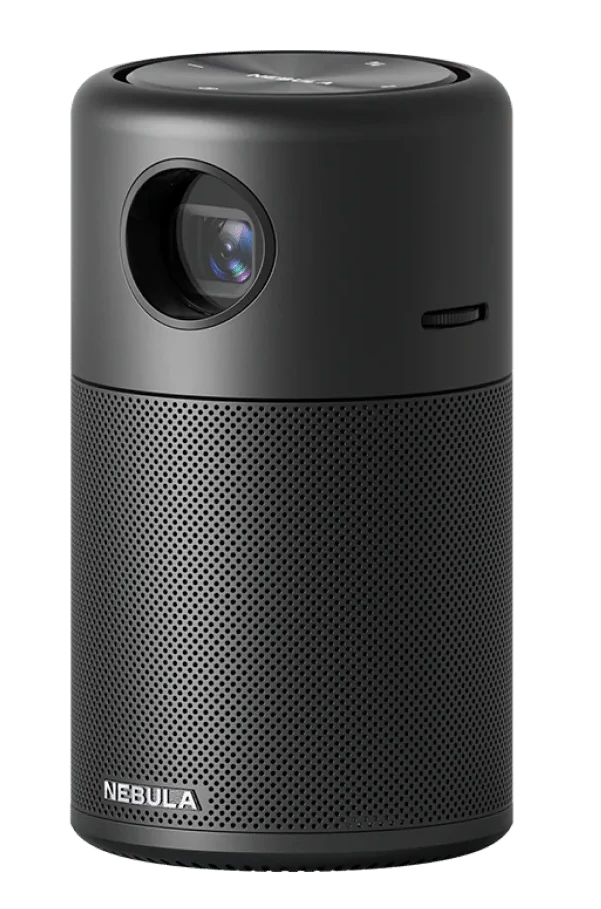
Photo credit: Nebula by Anker
Why we love it: The Anker Nebula Capsule is like a tiny but mighty entertainment system that connects to your iPhone or Android easily. It’s small and lasts for about 4 hours, so it’s perfect for entertainment on the move. With its 100 ANSI lumens brightness and 854 x 480 resolution, you’ll enjoy a decent view even in low light. It comes with an Android 7.1 interface for using different streaming apps, and the 360-degree speaker creates a really immersive sound.
Key Features
- 100 ANSI lumens brightness
- 854 x 480 resolution
- Android 7.1 built-in
- 360-degree speaker
- 4-hour battery life
- Autofocus and keystone correction
- Compact and portable “soda-can” design
- Nebula Connect app for remote control and navigation
Cons:
- Lower resolution compared to some other models
- Not ideal for bright environments
- Android 7.1 might feel a bit outdated
Connectivity: HDMI, USB, Wi-Fi, Bluetooth, and screen mirroring capabilities for effortless wireless connection with iOS and Android devices.
Best Mini Portable Projector: Kodak Luma 350

Photo credit: Kodak
Why we love it: The Kodak Luma 350 is a compact and portable projector that packs a decent punch despite its small size. It has a brightness of 200 ANSI lumens and a native resolution of 854 x 480. The integrated Android 6.0 OS lets you download and run apps directly on the projector, making it easy to stream content without external devices. It also features auto vertical keystone correction. Plus, with its built-in battery lasting up to 2.5 hours, it’s perfect for those spontaneous movie nights or impromptu presentations wherever you are.
Key Features
- 200 ANSI lumens brightness
- 854 x 480 resolution (supports up to 1080p playback)
- DLP technology
- 2.5-hour battery life
- Compact and portable “pocket” design
- Android 6.0 OS
- Built-in speaker
- Auto vertical keystone correction
- Kodak Luma app for basic remote control
Cons
- Not ideal for large rooms or bright environments
- Color accuracy and contrast can be improved
- Limited audio quality from built-in speakers
- Focus wheel can be finicky
Connectivity: HDMI, USB, Wi-Fi, and Bluetooth, enabling various connection possibilities for streaming and media sharing.
Budget-friendly alternative: If you’re looking for an even smaller and more affordable option, and don’t mind the image quality, consider the KODAK LUMA 75. It truly can fit in the palm of your hand and has a 1.5-hour battery life but with lower brightness (30 ANSI lumens) and resolution (480p native, supports up to 1080p playback).
Best Portable Projector for Gaming: XGIMI Halo+
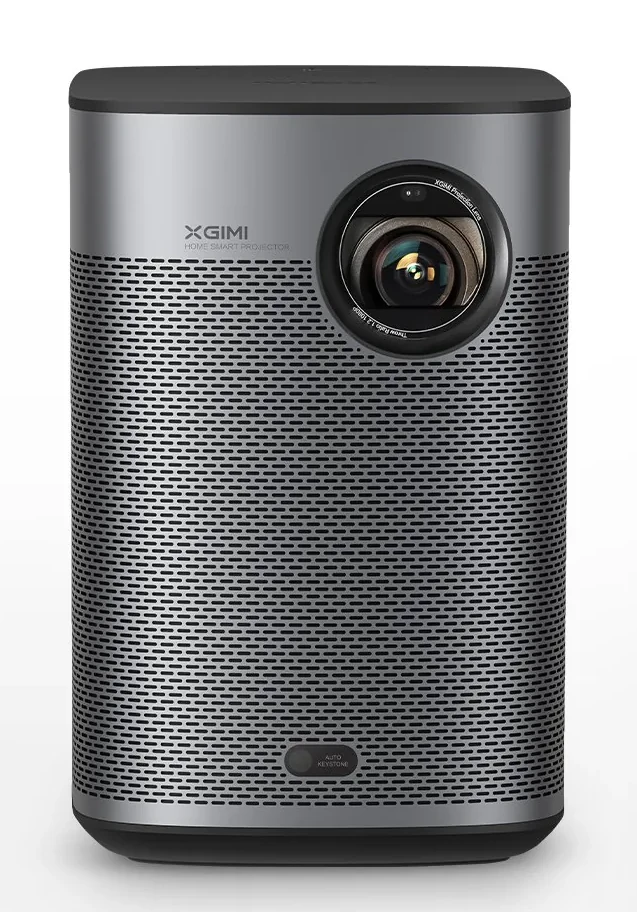
Photo credit: XGIMI
Why we love it: The XGIMI Halo+ is great for playing games and watching movies or shows. It’s super bright (900 ANSI lumens), so you get a really clear picture with vibrant and clear visuals, even if it’s not completely dark. The built-in Harman Kardon speakers sound amazing, and you won’t need extra speakers. Plus, the battery lasts 2.5 hours, and it has Android TV 10.0, so you can easily stream your favorite shows.
Key Features
- 900 ANSI lumens brightness
- 1080p resolution (Full HD)
- Harman Kardon speakers
- Android TV 10.0
- 2.5-hour battery life
- Autofocus and keystone correction
- Compact and portable design
- 3D mode support
- XGIMI Assistant app for basic remote control functions
Cons
- Can be a bit bulky compared to other portable projectors
- Pricey
Connectivity: HDMI, USB, Wi-Fi, Bluetooth, and Chromecast built-in, allowing for versatile connections with laptops, gaming consoles, streaming devices, and mobile devices for convenient wireless casting.
Your Ticket to Big-Screen Fun, Anywhere

Photo credit: Nebula by Anker
We’ve taken you through the key things to look for when picking a portable projector, showed you how versatile they can be, and even highlighted some of the best ones out there to fit different needs and budgets. From pocket-sized options for on-the-go fun to more powerful projectors for a true cinematic experience, there’s something for everyone.
Then, go out there and find the projector that will turn your movie nights, gaming sessions, and outdoor adventures into unforgettable experiences. With a portable projector by your side, the possibilities are endless. And don’t be afraid to get creative with how you use it!
FAQs
What is the ideal brightness for a portable projector?
The ideal brightness, measured in lumens, depends on your intended use and lighting conditions. For dimly lit rooms, 200-300 lumens might suffice. For brighter environments or outdoor use, aim for at least 500 lumens or higher.
What’s the difference between native resolution and supported resolution?
Native resolution is the actual number of pixels the projector can display. Supported resolution refers to the maximum resolution of video content it can play, which might be upscaled from its native resolution. For the best image quality, prioritize projectors with higher native resolutions.
Do I need a separate screen for a portable projector?
While a dedicated projector screen provides the best image quality, you can also project onto a blank wall or even a white sheet in a pinch. Just make sure the surface is smooth and free of any obstructions.
Can I connect my smartphone or tablet to a portable projector?
Yes, most portable projectors offer various connectivity options, including HDMI, USB, Wi-Fi, and Bluetooth. Many also support screen mirroring or casting, allowing you to wirelessly display content from your smartphone or tablet.
Can I use a portable projector in daylight?
While it’s possible to use a portable projector in daylight, the image quality might be compromised due to ambient light. For optimal viewing in brighter environments, choose a projector with high brightness (at least 500 lumens) and consider using a dedicated projector screen.
What are the disadvantages of mini-projectors?
The main disadvantages of mini-projectors are smaller screen sizes, lower brightness, and more limited resolution compared to larger, more powerful projectors.
Can you watch Netflix on a portable projector?
Yes. It might require some additional setup or workarounds depending on the specific projector model and its features. Pro tip: Check the projector’s specifications and user reviews to ensure it supports Netflix playback and HDCP compliance before making your purchase.
Is it worth buying a mini projector?
Buying a mini projector can be worthwhile depending on your needs and usage case. Mini projectors are compact, portable, and affordable, making them suitable for casual viewing, presentations, and small-scale home entertainment.
What is the number 1 portable projector?
The Anker Nebula Capsule 3 Laser. Its compact design, decent brightness, good image quality, smart features, and additional Bluetooth speaker functionality make it an appealing option for a wide range of users.




